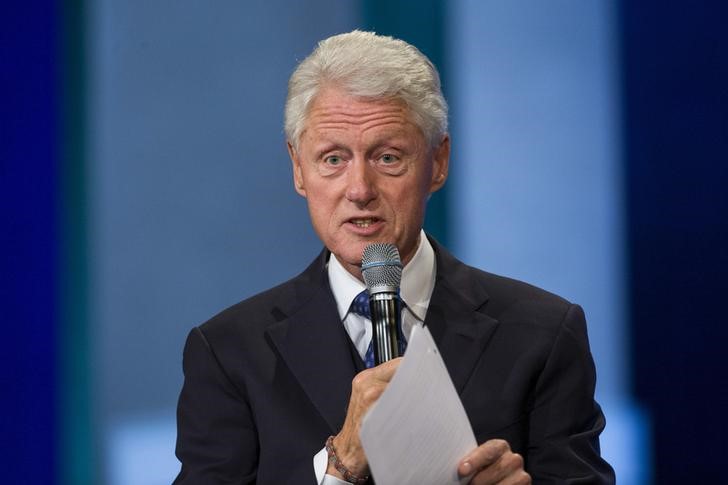NEW YORK (Reuters) - Hillary Clinton's second bid for the Democratic presidential nomination has so far seen little of her husband, former President Bill Clinton, on the campaign trail.
But that will soon change - although whether for the better or the worse remains an unanswered question.
Will the gregarious former president, who is known for his ability to connect with ordinary voters, be a help or a hindrance to his more reserved wife on the campaign trail?
The word from voters is that Bill could be a help in the Democratic primary, but should Hillary Clinton make it to the general election her campaign might want him to take a step back.
More than 40 percent of independent voters in a poll by Reuters/Ipsos were unsure whether the former president would help or hurt Clinton as she campaigns for the November 2016 presidential election. Twenty-six percent thought he would hurt her chances
By contrast, among Democratic voters, about 55 percent thought Bill would help his wife's chances of winning the election.
Bill Clinton has so far kept a low profile in his wife's campaign, but on Saturday he will deliver remarks at a rally in downtown Des Moines, ahead of the Iowa state party's Jefferson-Jackson Dinner. The rally and traditionally high-profile dinner come barely more than three months ahead of the Iowa caucuses, the country's first nominating contest.
The poll results may resonate because going beyond the Democratic base to win over independent voters could help Hillary Clinton compete against whoever emerges as her Republican opponent in the general election.
The poll underscores the challenges of figuring out how to deploy Bill Clinton, who was president from 1993 to 2001, on the campaign trail.
"Having a former president on the campaign trail, as far as I'm concerned, is a good thing, but it needs to be done carefully," said Jim Manley, a Democratic strategist supporting Hillary Clinton and a former aide to Harry Reid when he was the Senate Majority leader.
"I assume that the Clinton campaign is going to make sure that he doesn't overshadow her as he begins to ramp up his campaigning," Manley added.
Steven Schale, a Democratic strategist based in Florida, said the campaign should be judicious using him as a surrogate. Schale had supported a possible presidential run by Vice President Joe Biden, who on Wednesday announced he would not seek the White House.
The former president, for example, has long been popular among minority voters, who have been growing in demographic importance in the United States.
"Independents are not monolithic," Schale said. "They run the ideological gamut."
The poll was conducted from Oct. 2-21, with a national sample of 2,440 Democrats, 2,300 Republicans and 829 independents.
The precision of Reuters/Ipsos polls is measured using a credibility interval. This poll has a credibility interval of plus or minus 1.4 percentage points for all respondents, plus or minus 2.3 percentage points for Democrats and Republicans and plus or minus 3.9 percentage points for independents.
Among Republicans, 35 percent of poll respondents thought Bill Clinton would hurt Hillary's campaign and 34 percent were unsure.
Nonetheless, because Bill and Hillary Clinton have been national figures for so long, they share a relatively rare trait among American politicians, for good or ill: familiarity.
"The mass of critical opinion about the Clintons has been formed over several decades," said Phil Musser, a Republican strategist who is not working with any presidential campaigns.

That means that any continuing questions about Bill Clinton, such as controversies over donors to his family foundation, "are a possible distraction," he said.